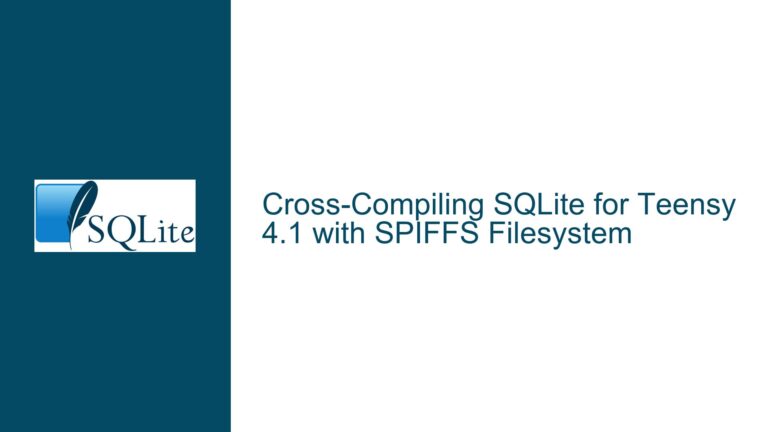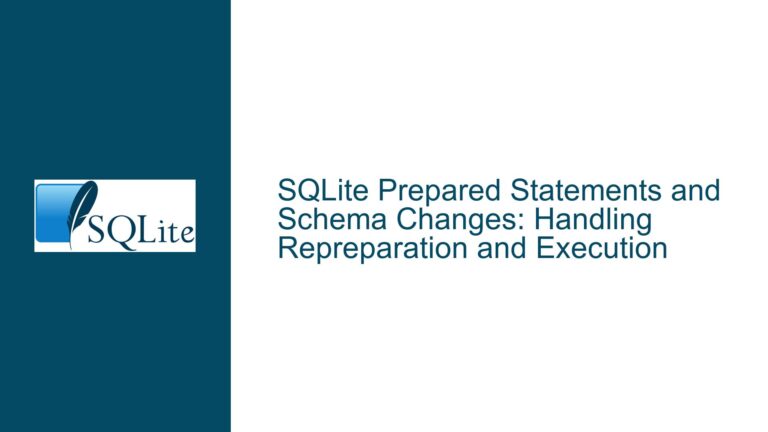Resolving Implicit Integer Precision Loss Warnings in SQLite Xcode Builds
Understanding Implicit Integer Conversion Warnings in SQLite Code
Core Problem: Integer Precision Loss Across Variable Assignments
The warnings arise due to assignments between variables of different integer types where the target type has a smaller storage size than the source type. In SQLite’s C codebase, variables such as i64 (64-bit integers), size_t (unsigned long), and ssize_t (signed long) are assigned to int (32-bit integers) without explicit casting. Xcode’s Clang compiler enforces strict type checking, flagging these assignments as potential bugs. While SQLite’s logic often ensures values remain within 32-bit ranges, the compiler cannot infer these constraints, leading to warnings. Examples include:
- 64-bit to 32-bit assignments:
sqlite3_int64(along longtypedef) assigned tointvariables (e.g.,pIn[0] = nAllocin line 35151). - Size-specific type mismatches:
size_t(platform-dependent unsigned long) orssize_t(signed long) assigned toint(e.g.,length = jin line 3069). - Function return type truncation:
osPreadreturnsssize_t, stored in anintvariable (line 39450).
These issues are compiler-specific because MSVC and GCC often ignore such warnings by default or handle type widths differently (e.g., long being 32-bit on Windows but 64-bit on Unix-like systems).
Root Causes: Type System Incompatibilities and Compiler-Specific Behavior
Cross-Platform Type Width Variations:
SQLite’s codebase prioritizes portability, but differences in type definitions across compilers create inconsistencies. For example,intis 32-bit on all platforms, butlongand pointer types vary. Xcode’s Clang on macOS uses 64-bitlongandsize_t, while MSVC on Windows uses 32-bitlong.Ambiguous Value Range Guarantees:
SQLite often uses 64-bit integers for intermediate calculations (e.g.,iJDfor Julian date counters) but stores results in 32-bit variables when values are known to fit. The compiler cannot validate these assumptions, triggering warnings.Compiler Warning Sensitivity:
Xcode enables-Wshorten-64-to-32by default for 64-bit architectures, while GCC and MSVC require explicit flags (-Wconversion,/W3) to emit similar warnings.Legacy Code and Incremental Refactoring:
SQLite’s codebase has evolved over decades, with sections optimized for performance or compatibility. Direct assignments between types were historically acceptable but clash with modern compiler checks.
Systematic Fixes for Precision Loss Warnings
Step 1: Analyze Variable Usage and Data Ranges
For each warning, determine whether the source value can exceed the target type’s maximum:
- Example (Line 35151):
nAllocis asqlite3_int64(64-bit) assigned topIn[0], a 32-bitint. IfnAllocrepresents an array size, verify that SQLite’s memory management ensures sizes stay belowINT_MAX(2,147,483,647). If true, an explicit cast is safe:pIn[0] = (int)nAlloc; // nAlloc ≤ INT_MAX per SQLite's allocation logicIf uncertain, add assertions or runtime checks:
assert(nAlloc <= INT_MAX && nAlloc >= 0); pIn[0] = (int)nAlloc;
Step 2: Refactor Variable Types for Consistency
Where possible, align variable types to eliminate conversions:
- Example (Line 3069):
lengthis declared asintbut assignedj, which is a 64-bit counter. Iflengthis part of a performance-critical loop, changing it tosqlite3_int64may be optimal:sqlite3_int64 length = j; // Eliminates warning, avoids castingIf the variable is part of a struct or API expecting
int, document the safe truncation:length = (int)j; /* j < INT_MAX due to buffer size constraints */
Step 3: Use Compiler-Specific Pragmas for Local Suppression
For platform-specific code blocks where truncation is intentional, suppress warnings locally:
#pragma clang diagnostic push
#pragma clang diagnostic ignored "-Wshorten-64-to-32"
osWrite(fd, "S", 1); // ssize_t → int, safe on macOS
#pragma clang diagnostic pop
Step 4: Update SQLite Source Code with Community Patches
The SQLite team addressed similar issues in commit 0216ce23cf23bc14, which widened variables to 64-bit. Merge these changes into your source tree or update to a version containing the fix.
Step 5: Validate with Custom Compiler Flags
Build SQLite with stricter settings to uncover hidden issues:
CFLAGS="-Wconversion -Wsign-conversion" ./configure
This mimics Xcode’s behavior on other platforms, ensuring cross-compiler consistency.
Step 6: Audit Platform-Specific Code Paths
For macOS-specific logic (e.g., afpSetLock in line 39799), ensure type matches between system calls and SQLite’s variables. The sharedLockByte calculation involves pInode->sharedByte, which might need a 64-bit type if lock offsets exceed 32 bits.
Final Code Fixes for Reported Examples
Line 24155 (Julian Date Calculation):
DeclareiErrassqlite3_int64to matchnew.iJDandiOrigJD:sqlite3_int64 iErr; // Was previously intLine 35151 (VList Allocation):
Explicitly castnAlloctointafter validating its range:assert(nAlloc <= INT_MAX); pIn[0] = (int)nAlloc;Line 39450 (File Read Operation):
Declaregotasssize_tto matchosPread’s return type:ssize_t got = osPread(id->h, pBuf, cnt, offset);
By methodically addressing each warning’s context—through type adjustments, explicit casting, or compiler directives—developers can maintain SQLite’s correctness while silencing Xcode’s warnings. Always validate fixes with regression tests, particularly for date/time functions and file I/O, where integer precision is critical.






